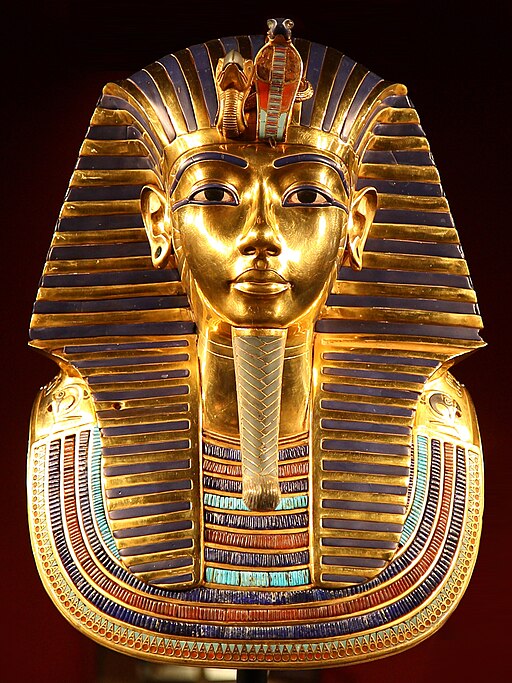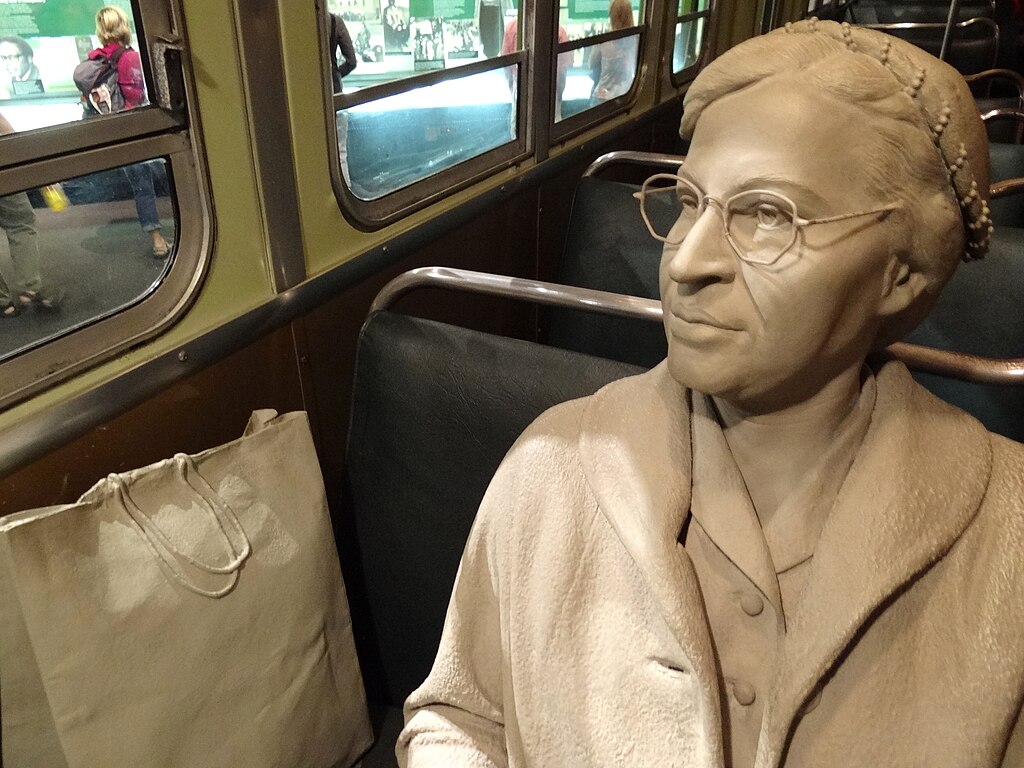
“The Allegory of Faith” by Johannes Vermeer was painted about 1670 and depicts a woman in an elegant white and blue satin dress with gold trimmings. She is surrounded by iconography related to faith.
She sits on a platform a step higher than the marble floor, her right foot on a terrestrial globe and her right hand on her heart as she looks up, adoringly, at a glass sphere hung from the ceiling by a blue ribbon.
Vermeer’s iconography in the painting is mostly taken from an academic book of allegorical illustrations. The book had accompanying moral themes, which had been translated into Dutch in 1644.
The book of allegorical illustrations provides many of the symbols in the painting. The symbolism includes the color of the woman’s clothing, her hand gesture, and the presence of the crushed snake and the apple.
Amongst the many symbols in this painting are the following:
- The woman is dressed in white signifying light and purity;
- The blue in the women’s dress relates to heaven;
- Her hand on her breast symbolizes that the virtue rests in her heart;
- Christ is represented in the cornerstone crushing the snake, a symbol of the Devil;
- The apple, the fruit Eve gave to Adam represents original sin, which in Christian doctrine required the sacrifice of the Savior;
- The globe of the earth under the woman’s right foot symbolizes Faith as having the world under her feet;
- The woman’s pearl necklace relates to pearls as ancient symbols of virginity; and
- The sphere is a symbol of the human mind and its capacity to reflect and to believe in God.
The painting’s iconography also has Catholic symbolism influenced by Jesuit ideas. The woman’s left arm is resting on the edge of a table, which holds a golden chalice, a large book, and a dark-wood crucifix.
Behind the crucifix is a gilt-leather panel screen. Beneath the book is a long piece of priest’s cloth. Resting on top of the book is a crown of thorns on the far wall behind the woman, a large painting of Christ’s crucifixion.
Vermeer was born and raised Protestant but converted to Catholicism on the occasion of his marriage into a Catholic family.
Allegory
Allegory in Art is used to illustrate or convey complex ideas and concepts in ways that are understandable or striking to its viewers.
The origins of Allegory can be traced at least back to Homer in his use of personifications of Terror (Deimos) and Fear (Phobos). There many Allegorical Paintings in museums including:
- Sandro Botticelli – Primavera (c. 1482)
- Albrecht Dürer – Melencolia I (1514)
- Jan Vermeer – Allegory of Painting (c. 1666)
- Jean-Léon Gérôme – Truth Coming Out of Her Well (1896)
Johannes Vermeer
Johannes Vermeer (1632 – 1675) was a Dutch Baroque Period painter who specialized in domestic interior scenes of middle-class life. He was a moderately successful painter in his lifetime.
However, he was not wealthy, leaving his wife and children in debt at his death.
There are only thirty-four paintings by Vermeer, and they are challenging to date. Vermeer painted mostly domestic interior scenes, and most of his pictures are set in the rooms of his house in Delft.
There are similar furniture and decorations in various arrangements in his domestic scenes, and his art often portrays the same people. He was not wealthy, as he left his family in debt after his death.
He produced relatively few paintings compared to his contemporaries. Art historians mainly overlooked Vermeer’s works for several centuries after his death.
However, his reputation has skyrocketed in the last few hundred years, and he is particularly renowned for his masterly treatment and use of light in his work.
The Allegory of Faith – Allegory of the Catholic Faith
- Title: The Allegory of Faith, also known as Allegory of the Catholic Faith
- Artist: Johannes Vermeer
- Year: 1670 –72
- Type: Oil on canvas
- Period: Dutch Golden Age
- Dimensions: Height: 114.3 cm (45 ″); Width: 88.9 cm (35 ″)
- Museum: Metropolitan Museum of Art – MET
Johannes Vermeer
- Artist: Johannes Vermeer
- Born: 1632 – Delft, Dutch Republic
- Died: 1675 (aged 43) -Delft, Dutch Republic
- Nationality: Dutch
- Movement Dutch Golden Age, Baroque
- Notable works:
- Girl with a Pearl Earring
- The Concert
- Lady at the Virginal with a Gentleman
- Woman with a Pearl Necklace
- The Milkmaid
- The Little Street
- The Allegory of Faith
- The Music Lesson
- The Lacemaker
- The Geographer
- Girl Reading a Letter at an Open Window
- A Young Woman standing at a Virginal
- A Lady Writing a Letter
Vermeer and Allegory Through the Ages
Explore the Metropolitan Museum of ArtMET European Paintings Collection
- “Pygmalion and Galatea” by Jean-Léon
- “Saint Jerome as Scholar” by El Greco
- “Portrait of Juan de Pareja” by Diego Velázquez
- “Camille Monet on a Garden Bench” by Claude Monet
- “View of Toledo” by El Greco
- “The Musicians” by Caravaggio
- “The Death of Socrates” by Jacques-Louis David
- “The Harvesters” by Pieter Bruegel the Elder
- “Young Woman Drawing” by Marie-Denise Villers
- “The Grand Canal, Venice” by J. M. W. Turner
- “The Houses of Parliament (Effect of Fog)” by Claude Monet
- “Madame Cézanne in a Red Dress” by Paul Cézanne
- “The Fortune Teller” by Georges de La Tour
- “The Allegory of Faith” by Johannes Vermeer
The Art of Painting
MET Modern and Contemporary Art Collection
- “Reclining Nude” by Amedeo Modigliani
- “Improvisation 27 (Garden of Love II)” by Wassily Kandinsky
- “Jeanne Hébuterne” by Amedeo Modigliani
- “The Card Players” by Paul Cézanne
- “Bathers” by Paul Cézanne
MET American Wing Collection
- “Washington Crossing the Delaware” by Emanuel Leutze
- “Portrait of Madame X” by John Singer Sargent
- “Mother and Child” by Mary Cassatt
- “Fur Traders Descending the Missouri” by George Caleb Bingham
- “The Gulf Stream” by Winslow Homer
- “The Parthenon” by Frederic Edwin Church
- “The Aegean Sea” by Frederic Edwin Church
Rembrandt vs Vermeer: The Titans of Dutch Painting
~~~
“Tears come from the heart and not from the brain.”
– Leonardo da Vinci
~~~
Photo Credit: 1) Johannes Vermeer [Public domain]
Popular this Week







 Sponsor your Favorite Page
Sponsor your Favorite Page SEARCH Search for: Search Follow UsJoin – The JOM Membership Program
Sponsor a Masterpiece with YOUR NAME CHOICE for $5
Share this:
- Tweet
